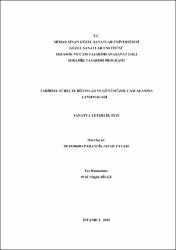Mimar Sinan Fine Arts University Institutional Repository
DSpace@MSGSÜ digitally stores academic resources such as books, articles, dissertations, bulletins, reports, research data published directly or indirectly by Mimar Sinan Fine Arts University in international standarts, helps track the academic performance of the university, provides long term preservation for resources and makes publications available to Open Access in accordance with their copyright to increase the effect of publications.Search MSGSÜ
Alternatif eğitim ve toplumsal değişim üzerindeki etkisi: Waldorf Okulları örneği
Abstract
17. yüzyılın sonlarından itibaren Avrupanın iç dinamikleri ve çevre şartlarıyla ortaya çıkan modernizm ile toplumsal hayatın hemen her kesimi standardize ve senkronize edilmiş, merkezileştirilmiş, çalışma hayatı uzmanlaş- ma ve yoğunlaşma biçiminde düzenlemiştir. Bu ilkeler doğrultusunda, modern toplumun gereği ve sonucu olarak ortaya çıkan modern eğitim ve okul, toplumun kontrolü, dönüştürülmesi ve devletin ideoloji aktarım aracı olarak tasarlanmıştır. Ana-akım eğitim olarak adlandırılabilecek sistemde, çoğunluk- la tek-tip bireylerin yetiştirilmesi amaçlanmaktadır. Özellikle II. Dünya savaşı sonrasında bu okulların karşısında birey, demokrasi, farklılık, değer dünyası, çok kültürlülük, vb. kavramlarla, gündeme gelmeye başlayan alternatif eğitim ve okul, çoğunlukla modern eğitimin herkes için belirlenmiş ilkelerine karşı, bireysel ve toplumsal farklılıkları ön plana alan, ihtiyaçlara göre eğitim verme- yi hedefleyen bir yaklaşımdır. Böylece eğitimle toplumsal değişme arasındaki korelasyonda farklılık ortaya çıkmıştır. Bu kapsamda çalışmanın amacı alterna- tif eğitimin gelişimiyle ilgili temel ilkeleri ortaya koymak ve alanın en özgün ve yaygın kabul gören örneklerinden biri olan Waldorf Okullarını incelemektir. Çalışmada literatür tarama ve katılımcı gözlem tekniği kullanılmıştır. Modernism emerged in the late 17th century from the internal dyna- mics and social factors of Europe. With this new movement almost all aspects of social life is standardized, synchronized and centralized. Work, on the other hand, organized around the principles of concentration and specialization. Modern education was also shaped by those principles. In this process, educa- tion is instrumentalised as the most effective factor for social change. Both a necessity and a result of modern society, modern education and its prominent institutions schools are formulated as instruments for social change and social control. Education and school are also utilized as vehicles for the transfer of state s ideology. This new system of modern education can be named as main- stream education . Along with the concepts of individual, democracy, differen- ce, moral values and multiculturalism, alternative education, came to the fore- front as an opponent view to mainstream education. In contrast to modern edu- cation s unified principles, alternative education values individual and societal differences and intends to provide education based on different needs. With this alternative approach of education the relation between education and social change moved to a different level. In this vein, purpose of the study is both to discuss alternative education s development and main principles and to analy- ze one of the most unique and widely accepted examples of alternative educa- tion, Waldorf Schools . This paper is based on literature review and partici- pant observation technique.
Source
Milli EğitimVolume
44Issue
205Collections
- TRDizin [1118]















